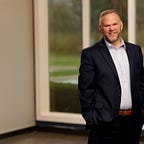Everyone is born a risk taker
Editor’s Note: Justin Elbert is community relations & education foundation manager at Klein ISD in Klein, Texas. This essay originally appeared in the September 2017 issue of the 1635 newsletter. Subscribe here.
Seven years ago, I began my professional career at a local educational institution. There I was on day one sitting down for my first meeting. I was excited and ready to do my part to help out.
The conversation shifted to my area of expertise — the reason I was hired — so I took the risk of speaking up. After sharing my idea, everyone just stared at me as they went back to their previous discussion.
My boss pulled me aside on the way out and said, “Don’t say anything at the next meeting. Actually, don’t say anything for the next six months. Just listen and take notes.”
I was crushed and never again took another risk while I was there. I also immediately started looking for a new job.
Unfortunately, I believe if you truly think about it, we’ve all had that experience. A time when we stood up and took a risk and were shot down. It hard to recover from that, but here’s the important thing to understand: Everyone is born a risk-taker. Your first step was a risk. The first time you rode a bike was a risk. Risk taking comes naturally to us. We don’t have to learn to take risks; we have to re-learn how to take risks. It’s something we lose the older we get because we’re afraid to fail.
Fast forward to today, and thankfully I work for a school district that actively welcomes and encourages everyone in the system to take risks — and sometimes fail.
Risk-taking in Klein ISD is part of something we like to call the “Golden Thread of Innovation.” It’s becoming a part of our culture. It’s the thing which binds our new Strategic Plan together; a visual way to show that we’re open to everyone taking risks and that it’s okay to fail.
I’ve worked in K-12 systems before where risk-taking is actively opposed at the administrative level, and I know some of you have too. It creates a culture of fear. A fear to step out of your lane. A fear to embrace new ideas that aren’t explicitly approved. A fear of failing.
Failure is what scares a lot of people into playing it safe. Will all our risks pay off? No. Some will inevitably fail. Failing is part of taking risks. When you accept the fact that failure is a natural part of the innovation that follows risk-taking, then you can plan for it.
The truth is, no one gets it right 100% of the time, but I promise you’ll stay 100% right where you are if you never take the risk.
It’s our job as thought leaders and innovators to speak truth to power by leading the charge in taking risks. We must also model to everyone that it’s okay fail as long as we gave it our all.
Imagine what your organization could do if it empowered all employees to take risks without fear of failing. That’s what we’re doing in Klein ISD, and it’s making us stronger.
When a teacher took the risk to visually re-work one of our guiding documents without permission, we embraced it. When a central office employee decided to organize our mentor program, we embraced it. When a few teachers banded together to flip the classroom and use class time just to talk, we embraced it. Our staff takes these risks because we are actively modeling risk-taking at the district level.
Our biggest risk to date is making a promise to every student who enters our schools. Our promise is this: In Klein ISD, every student enters with a promise and exits with a purpose. Every student. Every single one will exit our system knowing their true purpose. That’s a big risk right there, but it’s one embraced by our entire community because the framework of risk-taking and possible failure is our culture.
And it’s building that risk-taking culture which I challenge you all to do. Embrace failure. Embrace taking risks. It’s the least we can do for our students because they will benefit regardless; whether it be from the innovation which follows our successful risks or the lessons learned from our failures.
1635 is a newsletter and a monthly moment to propel us forward in public education. Each month it features long-form content from those working both inside public education and from those on the outside looking in. We can learn so much from both viewpoints. The newsletter delivers the last Tuesday of every month. Subscribe.
